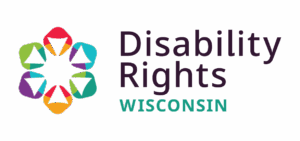Advocate
What is Advocacy?
 Advocacy is about speaking up and acting on behalf of yourself or others in order to make a desired change or outcome. At Disability Rights Wisconsin (DRW), advocating for the rights of people with disabilities is at the core of what we do, and we believe that expanding advocacy is integral to the Disability Rights movement. That's why we support everyone's effort to become an advocate for themselves, someone they know, or the disability community as a whole.
Advocacy is about speaking up and acting on behalf of yourself or others in order to make a desired change or outcome. At Disability Rights Wisconsin (DRW), advocating for the rights of people with disabilities is at the core of what we do, and we believe that expanding advocacy is integral to the Disability Rights movement. That's why we support everyone's effort to become an advocate for themselves, someone they know, or the disability community as a whole.
Why should I advocate?
 Advocacy is the most direct and often the best way to secure the change you desire in your own life and the lives of others. It enables you to have a voice on issues that are important to you, your life, and your rights. Through advocacy you can connect with others who feel the same as you and work together toward a common goal. It gives you more autonomy, and can enhance your sense of purpose, belonging, and power.
Advocacy is the most direct and often the best way to secure the change you desire in your own life and the lives of others. It enables you to have a voice on issues that are important to you, your life, and your rights. Through advocacy you can connect with others who feel the same as you and work together toward a common goal. It gives you more autonomy, and can enhance your sense of purpose, belonging, and power.
That is why it is important for people with disabilities and those who care about them, learn how to advocate.
What can I do to advocate?
There are essentially three types of advocacy:
Self-Advocacy is about speaking up for oneself. It involves a person's ability to communicate and assert their own interests, desires, needs, and rights.
Individual Advocacy is when someone stands with or supports another person who has been treated unfairly or has been wronged and wants to do something to improve the situation. Individual advocacy can be provided by those who care about the person such as parents, guardians, family members, peers, and friends. It can also be provided by an agency that advocates on behalf of others such as Disability Rights Wisconsin.
Systems Advocacy is about changing policies, laws or rules, or systems that impact how someone lives their life. These efforts can be targeted at a local, state, or national agencies. The focus can be on changing laws or simply written or unwritten policy. What is targeted depends on the type of problem and who has authority over the problem (Brain Injury Resource Center, 1998). See our Take Action page for ways you can get involved.
Advocacy follows a simple formula: identifying a problem, and acting to change it.

Identify and Define
It is important to first identify and define the problem you are advocating for. You should be able to clearly state what the problem or issue is and what you want to have done about it. You need to identify the person or group who has the authority or ability to make the change that you want and how to contact them.

Act
After you define the issue you and determine who you need to contact that, you need to decide the best way to take action to address the situation.
Action often involves some kind of communication. This can be in writing, a phone call, an e-mail, or in person. What are key points in the message you want to give. Tell your story; this is a very effective way to help others understand how the issue impacts you and why your concern is so important.
You can network or partner with others. Find a group of people or an organization who share the same concerns as you. You can take action together through meetings, getting the word out to others who can help, or protesting, for example. Use all possible advocacy resources in your community.
Action may also involve educating yourself or others to have a broader understanding of the issue or to better understand your legal or appeal rights under the circumstances.
Some tools for good advocacy
Respect and understanding
Always be respectful in your interactions with others. Be sure to listen and seek to understand the perspective of others, even if you disagree with them. Be courteous and polite. It will go a long way to demonstrate how you want to be treated when you are expressing your views, so you can be heard.
Self-awareness
Being self-aware enables you to evaluate yourself in relation to others. What are the emotions and feelings you want to express? How might others respond to you? What will be the environment or physical location that you will be advocating in? As you prepare to advocate, think about how you want present yourself to others in a manner that is best suited for the situation.
Communication
How you connect, interact, and share your thoughts and feelings is important. What method of communication works best for you; in writing, in person, or over the phone? What is the best way for you to communicate given the situation? Whatever method of communication you choose, you want to clearly
- describe the issue
- how issue or concern affects you and your life
- what you want to see change
Potential Challenges in Advocacy
 As an advocate, you are likely to face challenges. People may not seem to care, not listen to you, disagree with you, or act resistant. Whatever happens, remain strong and keep trying. You may need to think about other ways to advocate or find someone else who can help. Talk to others for support.
As an advocate, you are likely to face challenges. People may not seem to care, not listen to you, disagree with you, or act resistant. Whatever happens, remain strong and keep trying. You may need to think about other ways to advocate or find someone else who can help. Talk to others for support.
Advocacy Resources
- Advocacy Tool Kit: View our complete toolkit and guide to self-advocacy and peer advocacy here (pdf).
- Do It Yourself Guide to Filing a Patient/Client Grievance: This is our self-advocacy guide for navigating the process of filing a grievance against a provider and understanding your rights as a patient or client. View the DIY Guide to Filing a Patient/Client Grievance here (accessible pdf).
We hope you are successful!
Get Updates from DRW!
Keep up with the Latest from DRW! You will receive an email when new posts are added to our website. By subscribing you agree to receive information from Disability Rights Wisconsin and agree with our Privacy Page. You may unsubscribe at any time.
